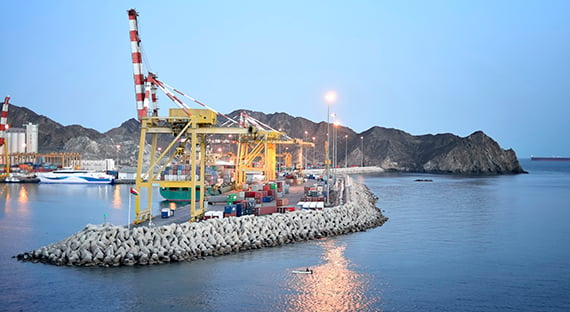
Muscat port, Oman. Gulf oil producers should diversify their economies to reduce their reliance on oil (photo: iStockphoto/Joesboy)
Simply Adjusting To Lower Oil Prices Will Not Be Enough For Gulf Oil Producers
December 14, 2017
Oil revenues have diminished, resulting in large budget deficits and slower growth, at a time when more jobs are needed to employ the young local population. In a nutshell, that’s the economic challenge facing the six countries in the Gulf Cooperation Council (GCC)—Bahrain, Kuwait, Oman, Qatar, Saudi Arabia, and the United Arab Emirates. In response, these countries are seeking to reduce their reliance on oil, strengthen their budgets, and encourage a more vibrant private sector than can create job opportunities for more people.
Related Links
Recent IMF studies examine how these countries could reduce their deficits while still encouraging economic growth, and how their central banks can ensure that credit continues to flow in support of the economy. Here is a brief overview of the key findings.
“The Economic Outlook and Policy Challenges in the GCC Countries” looks at economic prospects in the region and the strong start policymakers have made in addressing some of the budgetary challenges.
- Growth in non-oil industries is recovering to some extent, but speedier reforms are necessary to boost growth further and support economic diversification, private sector development, and job creation.
- These reforms include: reducing the role for the public sector, including through privatization and partnerships with the private sector; improving the business climate through better regulation, and more efficient government services to encourage foreign and domestic investment; encouraging nationals to work in the private sector by providing them with better education and training.
“How Can Growth-Friendlier Fiscal Adjustment be Achieved in the GCC?” considers how governments can further reduce their debt and deficits, while still protecting growth and jobs.
- Government spending is quite high in the GCC (and it rose further during the oil price boom). Reducing the level of spending will require revisiting the traditional role of the government as a provider of jobs and services.
- To ensure that economic activity stays vibrant, expenditure cuts need to focus on the public wage bill and subsidies. At the same time, governments should better target aid to those most in need and protect investment critical to growth. Governments also need to improve the quality of spending, including in health and education. In these sectors, government spending is high, but outcomes are not always commensurate with the level of spending.
“Strengthening Liquidity Management Frameworks in Support of Stability and Growth in the GCC” surveys how central banks can better anticipate and manage swings in the flow of money available to banks caused by large changes in oil prices.
- The decline in oil prices has resulted in periods of tight bank liquidity that has caused, in some cases, spikes in short-term interest rates and increased market volatility. This could harm the flow of credit.
- Central banks and ministries of finance need to cooperate on exchanging information on projected government cash flows, to allow central banks to forecast how much liquidity the banking system needs. Central banks should also review and, if needed, expand their instruments to inject or withdraw cash from the banking system.


